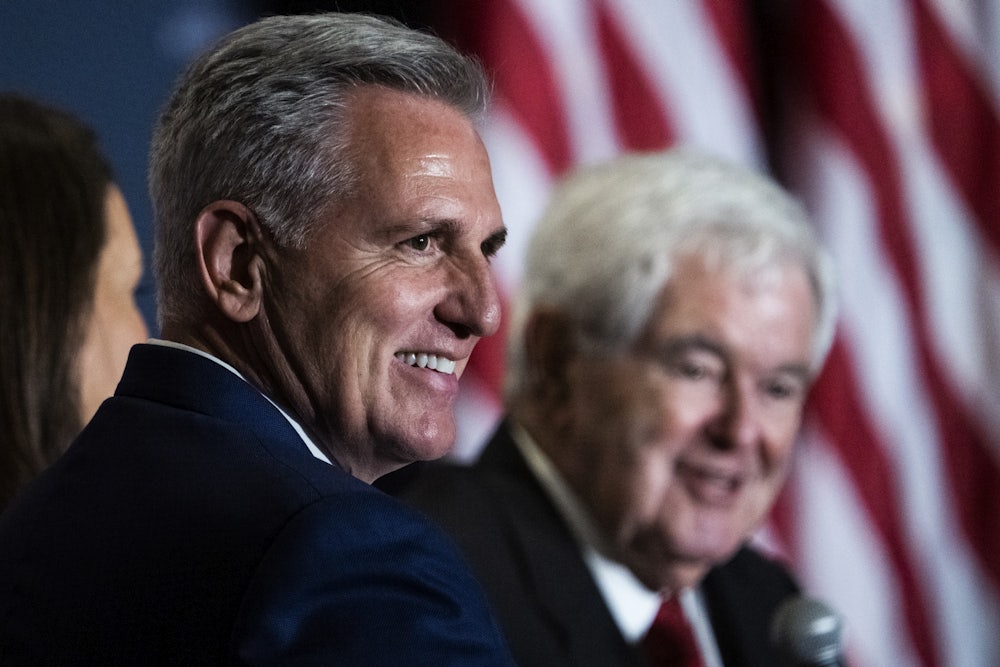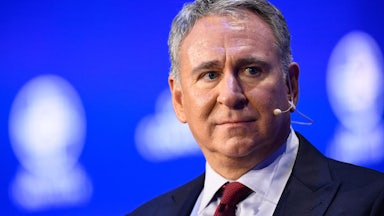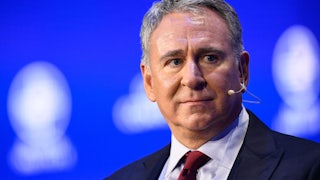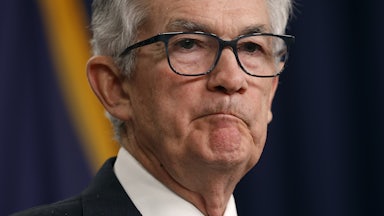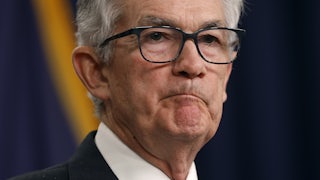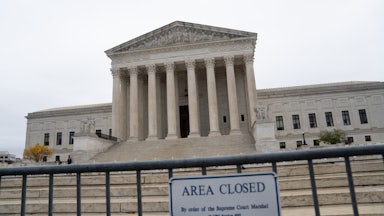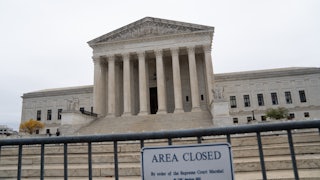Of course Kevin McCarthy spent the final weekend of the midterms campaigning with Newt Gingrich. The 79-year-old Georgian was the architect of the Republicans’ 54-seat romp in 1994 that gave the party its first House majority in 40 years. He’s also the second-most-toxic figure in American politics of the last 50 years (if you need me to tell you who number one is, you’re reading the wrong columnist), so the chosen pairing tells us something about what kind of House majority McCarthy intends to run if the Republicans prevail in Tuesday’s midterm elections.
If you’re under 50, Gingrich may be only a dim memory to you. He has injected many varieties of poison into our political discourse, but I’ll give him this: He is an undeniably important figure in modern American politics. He came up in Cobb and Gwinnett counties in suburban Atlanta in the 1970s and ’80s. A century-plus before, William Tecumseh Sherman had marched through those parts. Defense contracts enriched these counties during and after World War II. In the 1960s, when the city of Atlanta wanted to expand into Cobb, county officials quickly invented a new “city,” in some places just 10 feet wide, to keep Atlanta—and certain of its residents—out.
Today, Cobb and Gwinnett, with their large populations of college swells, are quite liberal and went strongly for Joe Biden in 2020. But in earlier decades, they were a perfect breeding ground for the kinds of racial and cultural resentments Gingrich was pushing. And boy did he push them. Just days before those fateful 1994 midterms, a young mother in South Carolina named Susan Smith put her two young boys in the family car and rolled it into a lake, drowning them. Gingrich invoked the crime as an example of “how sick the society is getting” and proof that people needed to vote Republican. Smith—who first told police, naturally, that her car had been stolen by a Black man—very clearly had mental health issues, a condition that had rather less to do with Tip O’Neill than with her stepfather, a devout Republican and Christian Coalition leader who had molested her as a teen.
McCarthy has never been the racial arsonist Gingrich was. There’s no shortage of other volunteers in the House GOP caucus for that line of work. He does however show every sign of wanting to be another kind of arsonist (and Gingrich was this too): a fiscal one.
You may remember hearing about the government shutdown of 1995–96. That happened because of a showdown between Gingrich and President Bill Clinton about the budget. Gingrich wanted deep cuts to Medicare and many domestic programs. Clinton wouldn’t budge. The government started shutting down on November 14, 1995. At first, the public blamed both parties equally. But at a breakfast meeting with reporters, Gingrich complained that Clinton wouldn’t meet with him on a long Air Force One flight (returning from Yitzhak Rabin’s funeral in Israel) and whined that he had to sit in the back of the plane. That became a famous New York Daily News cover, back when there was such a thing as famous Daily News covers, and Gingrich was toast. Clinton won the shutdown (even though, while White House staff were furloughed, he met an intern named Monica; Gingrich later impeached Clinton over his affair, with America not yet aware that Gingrich himself was having an affair at precisely the same time that he was heaping daily calumny on Clinton).
Gingrich was playing with tens of thousands of people’s lives, but McCarthy is signaling that he and his caucus are ready to play with something far more dangerous: They show every sign of being prepared to force the first debt default in the history of the United States.
Estimates are that we’re going to hit the fiscal cliff by the fall of 2023. We’ve seen this before. The 2011 standoff was the closest we’ve come to default because it was the first time the opposition party attached specific and severe conditions to voting to raise the debt ceiling. Barack Obama and then-Speaker John Boehner cut a last-minute deal involving “sequestration” budget cuts (which, by the way, are still in effect—Medicare payments were reduced by 2 percent in July under the terms of the 2011 deal).
Boehner did not want the United States to be unable to pay its debts. It would result in various kinds of disasters for the U.S. and the global economy, up to and including the dollar ceasing to be the world’s reserve currency. But what is McCarthy’s view of the matter? Axios quoted a GOP source in late September as saying: “Speaker [John] Boehner and a hypothetical Speaker McCarthy are different animals. Boehner was convinced of the necessity [of raising the debt limit] and was willing to twist arms. I just don’t know about a Speaker McCarthy.”
At a minimum, McCarthy’s House will make impossible demands of Biden in exchange for its votes: deep cuts to the IRS just for starters but also maybe deep cuts to Social Security and Medicare and other Democratic domestic priorities; also, excessive funding for Republican priorities, like a massive increase in border security spending and turning police departments into small armies with advanced weaponry to rout those antifa hooligans who keep masquerading as MAGA people and making all that trouble everywhere.
That’s at a minimum. At a maximum? They just won’t negotiate. Boehner had an unruly right wing to deal with, but that was nothing compared to a caucus where Marjorie Taylor Greene is going to be a kind of moral center of gravity (yeah, I write sentences these days I can’t quite believe). A substantial portion of the House GOP caucus will say to McCarthy: No deals with Biden. None. You make one, and we vote you out.
These people want default. They will gamble that it will be Biden’s default, not theirs. And if the American economy collapses under a Democratic president, hurting millions of people in the process, that’s fine by them. They’ll happily set the Reichstag on fire and see if they get the public to blame it on the other guys.
This is what voters—mostly swing voters, mad at Joe Biden about gas prices—are on the verge of empowering. And the likely new speaker, the new leader of this posse, is telling us something important by spending his final weekend on the campaign trail with the man more responsible than any other individual for leading the Republican Party down this rage-strewn path. We’d do well to listen.
